6 phrases that can change your approach to customer service
Friends, hello everyone!
We continue to translate and publish the best customer support materials for you. This article will discuss the fact that the use of certain phrases can change the perception of information by your users. “In a word, you can kill, but you can cure a person” (c) - with regard to customer support, this proverb is especially relevant! Below are six specific phrases that can make your customers happier.

From a translator: You can find the original article here . A list of previously translated materials is available at the end of the post. Happy reading, the team service team to support Teamdesk customers .
Much more than we can imagine depends on the wording. In fact, choosing the right word can play a huge role when it comes to human behavior or feelings.
Last year, Facebook changed “Hide / Mark as spam” to “I don't want to see this . ”

What is the result?
The number of people who are active in their news feed has increased by 58% .
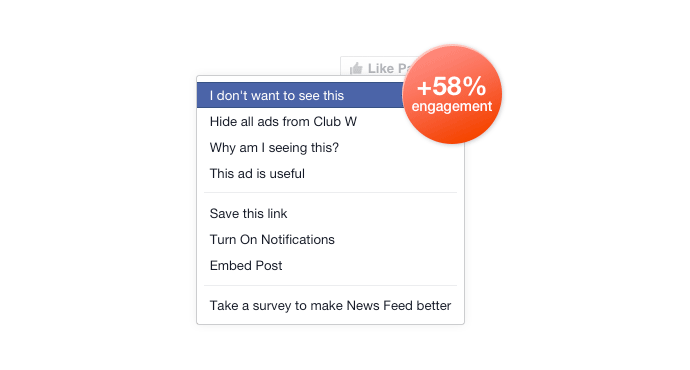
Just from changing a few words!
The same principle can be applied to customer service: the use of the right key phrases during communication can affect the negative experience of the client and give him a sense of satisfaction. Below you can find a list of six phrases that will help you improve support and build a deep customer relationship.
A few years ago I moved from San Francisco and I had to disconnect from cable Internet.
It should be noted that this year this company was recognized as the “ Worst Company in America ” ... and this was the second time.

I called the provider and said that I would like to disconnect.
Answer : “Call Accounting.”
Me : “Good. Can you transfer me to Accounting? ”
Answer : “We cannot do this. Here is their number. ”
Already feeling caring, I dialed the Accountant's number ...
Their answer : “I see, call this number here ...”
I spent another 45 minutes during the day to reach out to at least someone who could help me, until I posted about my problem on Twitter.
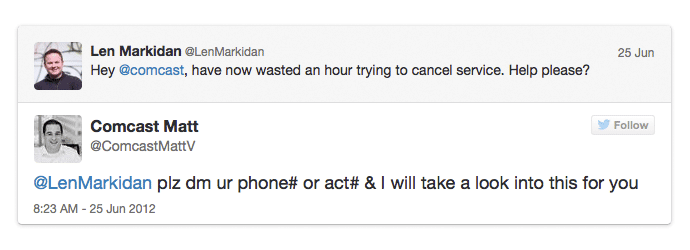
The only reason I still used this provider was because I had no choice.
But for most of us, our customers have a choice and it would be foolish to treat customers that way.
In 2011, a survey was conducted among customers , American Express asked respondents about which phrase when servicing is the most annoying for them.
And the winner !?

Good service does not consist in knowing the answers to all customer questions. Often, for good service, it is enough to save the client from an independent search for an answer. Do it for him.
There is a lot of research on the importance of empathy in customer service, but Seth Godin opened up the topic best in this short post :
The simplest customer service question of all:
“Why is this not as important to you as it is to me?”
Each of us was faced with this situation, and it does not matter at what point this happened. It could be a difficult conversation with a friend or family member: you do not know how your interlocutor feels and you may not understand why he behaves in this way. And even more so, you cannot influence this. But you can show your empathy and thereby make him empathize with you.
That is why it is so important not only to empathize, but also to try to pass it on to your client.
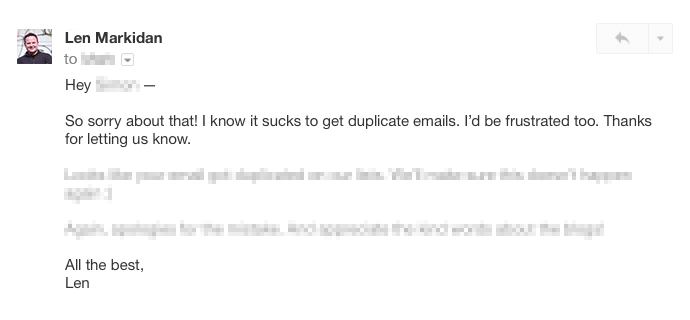
Researchers Andrew Nyberg and Mark Robert Voldman, in their book Words Can Change Your Brain , found that using positive words can dramatically change how we perceive reality.

With the help of positive words, you can make your customers (and you) feel more positive.
In a world where 95% of customers have already made their choice (for example, refused services or complained about it to others) because they have gained negative experience, the simplest tactics will be to use positive words when servicing a client, and this can give good results.
Therefore, when contacting a customer with a problem by email, instead of saying “I will do it for you,” tell him that you will be happy help him.
If the client sends a letter with the heading “Verification”, then we believe that this is our problem.
During testing of this phrase, we found out that the clients we keep in touch with are 10% more likely to answer us various questions by email than those that we keep in ignorance.

Two things that protect us from such appeals:
Although you may not know exactly when you will process his appeal, you can promise him to keep him updated regularly. This is not just a promise to keep him informed, it is an opportunity to build more trusting relationships.
According to the survey , only 1 out of 26 customers complains . T.O. you just don’t hear those 26 customers who are having difficulty.
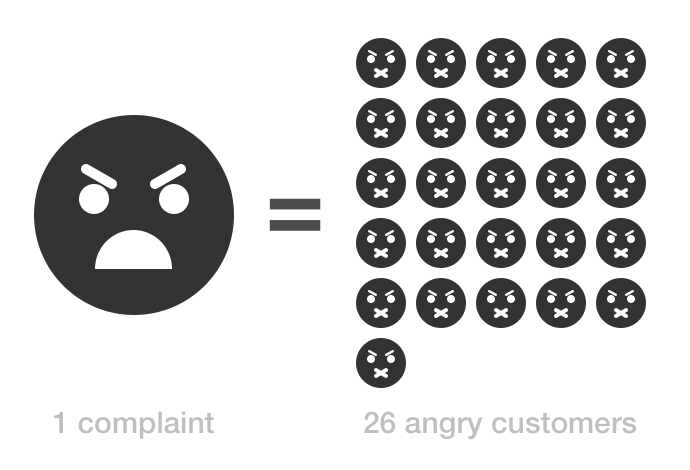
Each complaint may mean that there are dozens of other customers who are simply silent.
This means that solving the problem of one who applies can make dozens of other customers happy.
This is a huge opportunity. And this is a serious gift from a client who decided to inform you about it.
In the famous Dale Carnegie book, How to Make Friends and Influence People , one of the basic principles is to be generous with appreciation.
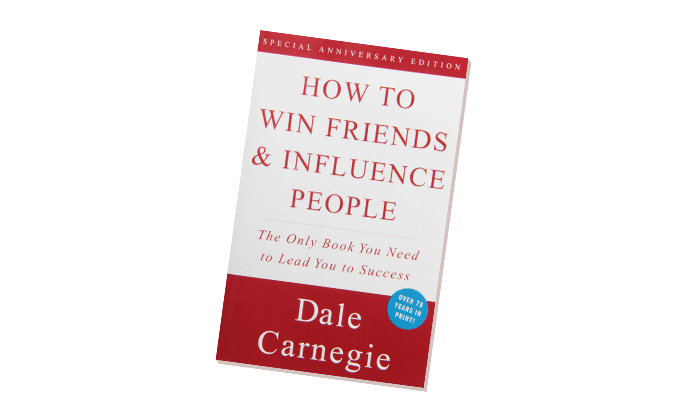
“In our interpersonal relationships, we must never forget that all our partners are human beings and want appreciation. This is a legal tender that can sweeten the soul. ”
To establish good relations with your customers (and not only), never forget to thank them.
Despite our best intentions and efforts, we cannot always be right.
In fact, one study says that although 94% of online stores provide email support, responses to 27% of these calls will not be satisfactory .
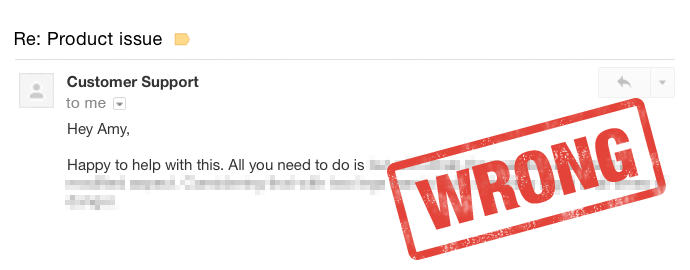
I suspect that most of those who read this article, on average, are much better at handling this situation. But the fact remains, there are cases when our answers are not complete and are not able to help the client. The problem is that most people do not want to talk about problems. So if your answers were not completely useful to the client, he will ask you to clarify the situation or contact you later.
This is the most common phrasein customer service. You leave the “door open” and make it clear to the client that he can speak out if he still has unresolved issues.
The introduction of these keywords and phrases in the customer service process will give an instant result and it will not take much time, because in the end you will get even more happy and loyal customers.
List of previously translated materials :
We continue to translate and publish the best customer support materials for you. This article will discuss the fact that the use of certain phrases can change the perception of information by your users. “In a word, you can kill, but you can cure a person” (c) - with regard to customer support, this proverb is especially relevant! Below are six specific phrases that can make your customers happier.

From a translator: You can find the original article here . A list of previously translated materials is available at the end of the post. Happy reading, the team service team to support Teamdesk customers .
How, in the right words, serving customers is even better.
Much more than we can imagine depends on the wording. In fact, choosing the right word can play a huge role when it comes to human behavior or feelings.
Last year, Facebook changed “Hide / Mark as spam” to “I don't want to see this . ”

What is the result?
The number of people who are active in their news feed has increased by 58% .

Just from changing a few words!
The same principle can be applied to customer service: the use of the right key phrases during communication can affect the negative experience of the client and give him a sense of satisfaction. Below you can find a list of six phrases that will help you improve support and build a deep customer relationship.
Phrase # 1. “I don't know, but I’ll find out for you.”
A few years ago I moved from San Francisco and I had to disconnect from cable Internet.
It should be noted that this year this company was recognized as the “ Worst Company in America ” ... and this was the second time.

I called the provider and said that I would like to disconnect.
Answer : “Call Accounting.”
Me : “Good. Can you transfer me to Accounting? ”
Answer : “We cannot do this. Here is their number. ”
Already feeling caring, I dialed the Accountant's number ...
Their answer : “I see, call this number here ...”
I spent another 45 minutes during the day to reach out to at least someone who could help me, until I posted about my problem on Twitter.

The only reason I still used this provider was because I had no choice.
But for most of us, our customers have a choice and it would be foolish to treat customers that way.
In 2011, a survey was conducted among customers , American Express asked respondents about which phrase when servicing is the most annoying for them.
And the winner !?

Good service does not consist in knowing the answers to all customer questions. Often, for good service, it is enough to save the client from an independent search for an answer. Do it for him.
Phrase # 2. “I would be disappointed too.”
There is a lot of research on the importance of empathy in customer service, but Seth Godin opened up the topic best in this short post :
The simplest customer service question of all:
“Why is this not as important to you as it is to me?”
Each of us was faced with this situation, and it does not matter at what point this happened. It could be a difficult conversation with a friend or family member: you do not know how your interlocutor feels and you may not understand why he behaves in this way. And even more so, you cannot influence this. But you can show your empathy and thereby make him empathize with you.
That is why it is so important not only to empathize, but also to try to pass it on to your client.

Phrase # 3. “I would be happy to help you!”
Researchers Andrew Nyberg and Mark Robert Voldman, in their book Words Can Change Your Brain , found that using positive words can dramatically change how we perceive reality.

With the help of positive words, you can make your customers (and you) feel more positive.
In a world where 95% of customers have already made their choice (for example, refused services or complained about it to others) because they have gained negative experience, the simplest tactics will be to use positive words when servicing a client, and this can give good results.
Therefore, when contacting a customer with a problem by email, instead of saying “I will do it for you,” tell him that you will be happy help him.
Phrase # 4. “I will keep you posted every [Day or Hour].”
If the client sends a letter with the heading “Verification”, then we believe that this is our problem.
During testing of this phrase, we found out that the clients we keep in touch with are 10% more likely to answer us various questions by email than those that we keep in ignorance.

Two things that protect us from such appeals:
- Make sure you keep the client up to date with the progress of processing his appeal as often as possible (at least once a day).
- Let the client know when they can definitely hear from you.
Although you may not know exactly when you will process his appeal, you can promise him to keep him updated regularly. This is not just a promise to keep him informed, it is an opportunity to build more trusting relationships.
Phrase # 5. “Your appeal is very valuable to us.”
According to the survey , only 1 out of 26 customers complains . T.O. you just don’t hear those 26 customers who are having difficulty.

Each complaint may mean that there are dozens of other customers who are simply silent.
This means that solving the problem of one who applies can make dozens of other customers happy.
This is a huge opportunity. And this is a serious gift from a client who decided to inform you about it.
In the famous Dale Carnegie book, How to Make Friends and Influence People , one of the basic principles is to be generous with appreciation.

“In our interpersonal relationships, we must never forget that all our partners are human beings and want appreciation. This is a legal tender that can sweeten the soul. ”
To establish good relations with your customers (and not only), never forget to thank them.
Phrase # 6. “Can I help you with anything else?”
Despite our best intentions and efforts, we cannot always be right.
In fact, one study says that although 94% of online stores provide email support, responses to 27% of these calls will not be satisfactory .

I suspect that most of those who read this article, on average, are much better at handling this situation. But the fact remains, there are cases when our answers are not complete and are not able to help the client. The problem is that most people do not want to talk about problems. So if your answers were not completely useful to the client, he will ask you to clarify the situation or contact you later.
This is the most common phrasein customer service. You leave the “door open” and make it clear to the client that he can speak out if he still has unresolved issues.
Conclusion
The introduction of these keywords and phrases in the customer service process will give an instant result and it will not take much time, because in the end you will get even more happy and loyal customers.
List of previously translated materials :
